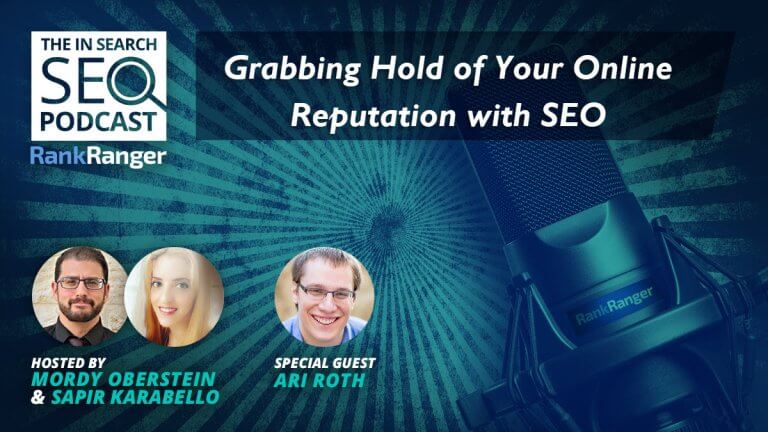In Search Podcast: Grabbing Hold of Your Online Reputation With SEO

Don’t forget, you can keep up with the In Search SEO Podcast by subscribing on iTunes or by following the podcast on SoundCloud!
Summary of Episode 49: How to Leverage SEO for Online Reputation Management
The great Ari Roth of Five Blocks joins us to talk about crafting your online reputation from an SEO perspective!
- How to maintain control of your brand’s narrative using Search
- Using the SERP to manifest your brand positively
- Handling inaccuracies that impact your brand’s identity when they appear within a Google property
Plus, is Google evil? The Wall Street Journal seemingly thinks so! We pick apart their article and the industry’s peculiar response to it!
Is Google Evil? When SEO Conspiracies Go too Far [00:03:13 – 00:17:35]
During episode 48 of the podcast, Mordy said he will talk about the Wall Street Journal’s take on Google, but as time went on he felt like covering it in-depth would be old news. That was until Barry Schwartz went ahead and wrote what Mordy thought was an objectively wonderful rebuttal of the Wall Street Journal’s take on SEO… and all hell broke loose.
So let’s get into some of the things the Wall Street Journal (WSJ) proposed to be Google truth:
Google favors big brands because they buy ads
Manual changes made by Googlers is some sort of editing free for all
The blacklisting of sites actually happens
Here are Mordy’s issues with the piece itself: First, they mention their research consists of 17 searches. Really? According to Mordy, he did 1700 searches last week! (An obvious, yet oddly believable, exaggeration.) Secondly, there’s a whole bunch of complaining in the piece about Google editing out offensive nonsense in the Autocomplete and how Google creates manual adjustments to the search results, etc. As Mordy put it on Twitter, “I don’t get their point on “censorship”: If your 11-year old kid searched from Biden or Trump for a project, would you want them to see “is a moron, is a putz…” despite your political leanings wouldn’t you want your 11-year old to see facts?” Do you really want kids seeing totally inappropriate things in the Autocomplete?
Moving on to Google’s supposed big brand preference…. The WSJ claimed that eBay suffers and Amazon wins on the SERP because Amazon spends more on ads. First off, Mordy remembers a study he did on a Google update at the behest of some people in e-commerce to see what sites were impacted and in that study, eBay won big and Amazon lost some nice rankings.
But what really is killing Mordy is the Amazon thing. Do you know how much Google invests in its SERP features and Google Shopping just to grab a user and pull them away from Amazon? Does the WSJ actually believe that Google will purposely give Amazon better rankings? Amazon is Google’s biggest threat! Google literally revamped its product Knowledge Panel into a commerce supercenter just to get folks to consider its own Shopping programs over Amazon!
What’s really confusing to Mordy is the supposed injustice when preferring a big brand. Fun fact, everyone loves big brands! When you need a heart transplant do you go to some mom and pop hospital or one of the top hospitals in the country? Mordy’s wife had her thyroid removed due to thyroid cancer at Johns Hopkins in Baltimore! And you know what Mordy didn’t say? “Well, I might seem biased towards big brands so I’ll take my wife to a no-name hospital.”
Think of any store chain. Mordy remembers as a kid there was this chain called Midas where you got your muffler and your brakes fixed and people liked going there because they trusted them. They would say to themselves, “It’s a brand, they won’t cheat me. They have no reason to. They’re a big brand. They’re reputable.”
So when the writers of the WSJ prefer a big brand in their personal life, no problemo, but when Google does it, oh no! They can’t do that. Google can’t view big brands as being authoritative. Google should say no to CNN, no to ABC News, no to CBS… Google should instead favor the Middle-of-Nowhere Times over the NY Times because Google must be fair and unbiased. Of course, the WSJ, being a major publication (aka a big brand) would not like that very much!
And if all this wasn’t enough, Barry Schwartz, the darling of the SEO world, the only good human being left among us, wrote a very well done rebuttal…and the SEO world lost its mind with it. There was nonsense out there like, “Isn’t Danny Sullivan a part-owner of Search Engine Land and he works for Google? Therefore, Barry your piece is a lie!” Even if it’s true that Danny Sullivan still has a stake in SEL… it’s Barry Schwartz we’re talking about. Do you really think they bought Barry off, compromised his integrity, and forced him to put out a sham?
The best were the folks who were like, “Yeah what the WSJ said was true. Evil empire this, evil empire that.” What was true was the WSJ didn’t say anything of substance, they just made a ton of accusations based on some things some people who we don’t know said. And that was Barry’s point. He was like, “Okay, you can think it’s true, but my point is that the WSJ has no proof.”
At most the WSJ piece should have been an editorial, at most… They were just throwing stuff out and not backing it up!
And this is what really got Mordy. Mordy has been very critical of Google at times. That said, there are SEO conspiracy theories and sometimes they make a lot of sense…. like Google using bounce rates to evaluate a site is something that Mordy can see being true even though Google flat out denies it. You can think he’s nuts and that’s fine… but that’s one thing. To say that Google is this dark entity of pure evil is something else entirely.
And after the reaction to Barry’s article, these theories really came out. Mordy saw how many SEOs believe this kind of stuff. This is too much, it goes too far, and it’s a skewed view of reality. Believing this can hurt your SEO practice because you’re disconnected from what Google does and really wants to do and that 100% impacts you as an SEO. It’s not just your theoretical opinion, it plays itself out in the underpinnings of how you approach SEO.
For Mordy, this is getting too much and he asks everyone to please take a piece of reality and chew on it. Google is a corporation with corruption like any and every corporation. At the same time, Google is a corporation that does a lot of good for its consumers like any other corporation. End of story.
Tackling Brand Reputation on the SERP: A Conversation with Ari Roth [00:17:52 – 01:10:14]
[This is a general summary of the interview and not a word for word transcript. You can listen to the podcast for the full interview.]
Mordy: Welcome to another In Search SEO podcast interview session. Joining us now is a self-described search enthusiast, the director of Search Strategy at Five Blocks. As featured on SERoundtable.com, here’s Ari Roth!
Welcome!
Ari: Thank you for having me, Mordy. It’s an honor to be here. I was just listening to your last podcast with Michelle Robbins and I feel like I have major imposter syndrome.
M: This is actually great follow-through as on last week’s podcast we spoke about reputation management, not from an SEO perspective and this week we’ll do it from an SEO perspective.
Before we get going, what is Five Blocks?
A: Five Blocks is an online reputation management (ORM) agency. It’s based in the US, but we have an office in the Jerusalem area. That’s the basics and I’ll go into more detail later on.
M: Awesome. Help us all get on the same page… what does reputation management from an SEO perspective mean?
A: The basic background is when a client comes to us when they feel they’re being unfairly misrepresented in the search results. For a regular SEO client, you will want to rank your site for a wide range of keywords related to your business/field. In reputation management, we’re looking at a whole bunch of sites from social media to profiles on business websites to rank for a much smaller and more focused set of keywords. The most common types of keywords would be the company or brand names, but even product names or hot button political issues are cases where people will hire us to get what they believe is a more accurate story.
M: At the end of the day, what does a good chunk of brand reputation look like once when it’s set up?
A: I think there’s a difference between perception and reality. ORM should relate to getting an accurate story out there and having that reflected online. Ultimately, though, you’ll look around and see things that don’t align with a certain brand. You could build this amazing brand and one thing might happen that gets you in hot water and that one thing sort of defines how they’re viewed at least in the lens of Google Search.
Where we come in is we try to use these SEO principles at a more holistic level by understanding which features Google wants to show and how it all works together to paint a picture that creates a more accurate story.
The “snake oil” equivalent of ORM uses these huge networks of churn and burn which they build up with a blog network (PBNs). They create nearly identical vanilla content across all of these sites and are all of them are interlinking between each other to use the dependence of linking in Google’s algorithm to trick Google. We don’t do that because 1) It’s immoral and 2) While it may solve the current issue, after a few months you’ll notice something is off. The search results should look natural. You shouldn’t be seeing the same article over and over again across multiple websites that no one has heard in your search results. We try to work within the sites you expect to see when a brand like yours is searched for and use those to paint the picture that clients are looking for.
We call our solution “intelligent” ORM because we have to work with the client in various departments to make sure that all the pieces are working together and all the different properties that Google naturally wants to show are working together in the right way.
M: When I think of a brand, I think of a ton of SERP Features on the SERP. When it comes to ORM, how do you leverage SERP Features to do that?
A: It depends on the SERP Feature. For instance, one of the most common features of a brand is the Twitter box. If there’s a Twitter account with whatever you’re searching for and they’ve been tweeting lately, then those tweets will show up in the search results. You just have to remember that if you retweet something without commenting, your tweet will not appear in the Twitter box.
M: And the Twitter box is really important because 1) it’s your own content and you control the narrative and 2) if there is something negative on the page that Twitter box might be what pushes it off to page two.
A: Right, and that’s more true for Twitter than other results because even if Google associates a Twitter account with a specific entity you’re searching for, if they haven’t tweeted recently their Twitter account might not show up. The only way it shows up is in the Twitter box. It’s something so simple yet has such a great impact.
M: I want to talk to you about schema markup. What markups do you prefer and do you not prefer or not recommend?
A: I don’t see any drawbacks from schema as long as you’re doing it right. In terms of what’s the most effective, there has been a lot of chatter in the community about the FAQ markup. We’re certainly on that bandwagon while it works. I don’t think though that the way SEOs are using FAQ markup is going to continue to work. If you look at the guidelines you see it’s really meant for FAQ pages as opposed to popping some FAQs at the bottom of the page. At the end of the day, we have to leverage the current features we can offer to our clients and therefore we are using it as part of our larger toolset.
M: Yeah, I think Google knows what’s going on, but they’d rather have the FAQ with “off-center” content rather than not having it at all. And once they get enough content where there’s a FAQ in every SERP, then they’ll start weeding them out.
A: I agree and just like the Twitter box you have to know how these features work. You have to know that FAQ markup only works on page one. If you have a page ranking on page two it won’t do anything until it climbs to page one. They’re limiting the number of sites to do this to three a page so they’re incentivizing you to be one of the early adopters. There have been tests that have shown that if you have FAQ markup and product markup on a page that Google will choose between the two.
We have done our own tests through the lens of ORM and I’m excited to hear your thoughts. First, our internal technology is called Impact. It shows us all of the locations and terms we’re researching every single day and it shows us the entire search page from one day next to the other. It shows us a whole set of patterns that we can leverage to guide strategy for the client. What we noticed when implementing the FAQ that the FAQ markup is itself considered an organic result in terms of the number of results on the page. The same thing goes with Twitter.
We also have a working hypothesis that Google is actively filtering out FAQ markup on site home pages. A colleague tested this on a sandbox site we use. He implemented the markup correctly, Google validated the markup, but it didn’t show up live in the search. He then changed the homepage URL to be sitename.com/home and all of a sudden it showed up.
M: That makes sense. It’s a little egregious because everyone knows there isn’t an FAQ on the homepage.
A: Particularly with these SERP features, you have to be up to date on what’s going in the SEO world and people like Barry Schwartz, Dr. Pete Meyers, Marie Haynes, are all examples of must-follow on Twitter. Once you know what’s going on you have the ability to test it on your own, see what works and what doesn’t either in a sandbox site or with clients who are a bit more adventurous to try new things. Either way, you’re testing and learning. Within our industry, the big key is to share your research and we all get better because of it.
M: You should also follow Valentin Pletzer because he’s a tremendous resource in finding new tests to the SERP. We have to discuss the Knowledge Panel. If you’re a brand/corporation, what do you need to show up in the Knowledge Panel?
A: I think you’re alluding to this article I wrote about Knowledge Panel identity theft where I did a test and claimed a Knowledge Panel of a playwright also named Ari Roth and long story short I was given access to the Knowledge Panel. I was not aiming at anything nefarious with the Knowledge Panel, I just wanted to prove a point as a curious SEO practitioner. In fact, after I wrote the blog post someone at Google must have read it and removed my access to the Knowledge Panel. In short, any brand/corporation needs to claim these Knowledge Panels for themselves before someone else takes it from them.
M: Obviously, to create a Knowledge Panel you need a Wikipedia page. What else do you need to get the Knowledge Panel?
A: Wikipedia is the silver bullet when it comes to Knowledge Panels. Other solutions are not as reliable. In the old days, there was a site called Freebase where it was like Wikipedia where you were guaranteed to get into the Knowledge Panel. These days it’s either Wikipedia or pray.
Wikipedia is its own ball game. To throw in a shameless plug, we have a free beta tool called Wiki Alerts where you sign up, you tell it which Wiki pages you want to track and it will send you email updates telling you any time a page you care about is edited. It’s totally free. It pulls the Wikipedia API every six minutes so at most you’re six minutes behind. If there’s evidence of vandalism you can detect it. Because Wikipedia has such a robust imprint in search and even in Wikipedia it has its own community who are constantly on Wikipedia, that’s something that’s a big part of your online reputation that you should care about.
You need to be familiar with how Wikipedia works. Companies themselves are discouraged from editing their own pages because of conflict of interest (COI). There are a couple of solutions. One is you can openly declare your conflict of interest and say that even though I have a conflict of interest I believe that A, B, and C should be changed to improve the page within the context of the product and make the page more encyclopedic and accurate in nature. And even if you have a COI, you can minimally revert overt vandalism. In any case, you should tread carefully and make sure you’re in accordance with the guidelines and best practices of each platform.
M: Would you consider Wikipedia to be the basis of creating an entity understanding and doing solid brand reputation management for SEO?
A: It’s definitely a big piece. What we found is that if you’re searching for a big company or person and they have a Wikipedia page, the Knowledge Panel will most certainly show up with a snippet from Wikipedia and also in the standard organic results it’s almost a lock that it appears on page one.
M: Right, and it’s another way to get things off the page.
A: There are other ways as well. Wikidata is a Wikipedia sister site that took the mantle from Freebase and is another feeder of the Knowledge Graph. For businesses, Bloomberg has a business database that feeds rather prominently. Schema organization markup doesn’t have a clear way it shows in search, but I think explicitly communicating certain aspects of your business to Google is something that can help create a well-rounded entity.
M: I’m curious to know how good is Google at accurately understanding entities?
A: On the whole or with specific misinformation.
M: Both.
A: Okay, on the whole, I think they’re pretty good at reflecting what the media and other people say. I don’t mean to attack the media. There’s this idea these days of fake news. For me, I don’t think the media is this sinister cabal that is intentionally distorting the facts to the masses for their personal gain, but the fact is I have seen the media make statements that are false and these statements become facts in the public eye especially through platforms like Wikipedia who view these news media sites as their best possible sources of information.
One example I had was a founder of a company who is no longer the CEO and isn’t part of the day-to-day business, something happened to him, and all of a sudden he’s being referred to as the CEO. That mistake could cause misinformation in different Google features.
You have to know how these features work, if there’s a place in these systems to correct misinformation manually when the algorithm gets something wrong, and be able to leverage those and submit that feedback to Google.
M: How do you that though at scale? For a small company a mistake could be fixed, but with a company with multiple locations, languages, and sub-sites, how do you go about doing that at scale?
A: As I said, our focus is much more narrow in terms of the search terms that we’re trying to impact. If someone is searching for ‘Wal-Mart’ and they find the wrong CEO information, hopefully whoever that is has taken our recommendation and taken their Knowledge Panel and then they have a more direct connection to Google notifying them of misinformation.
I think Danny Sullivan released a whole blog post with the different courses of action that are available when you come across problems in different Google features. There are special buttons for the Knowledge Panel, there are feedback buttons to report rich snippet spam, and in Wikipedia you can revert incorrect edits.
[Editor’s Note: I was doing SEO research and was looking at the Knowledge Panel of Dennis James, one of the original hosts of The Price is Right, but his profile picture was of a bodybuilder with the same name. I notified Google of this mistake in the Feedback tool and less than a week later the profile picture was changed to the correct Dennis James.]
M: Danny Sullivan is actually a great resource if you have a problem. I was doing my own research on voice search and for the query “the best generals ever” Hitler showed up. As a descendant of Holocaust survivors that didn’t sit well with me so I showed it to Danny and he fixed it.
A: Absolutely. I think there’s a problem in general with SEOs who deem Google as evil and they don’t want to tell Google their strategy lest one of their tactics be a fallow of Google’s guidelines and then Google will slap them down so they’re hesitant on asking Google. There are also legal agreements, especially in the reputation management industry. If it came out that a company with a bad reputation was working with a specific firm that would be very bad to come out and there are strict non-confidentiality agreements. I personally can’t leverage Danny as much as I would like to, but I have noticed that in certain instances where something egregious is going on not related to a client, he’s very helpful to pushing it to the relevant teams at Google and getting it fixed more quickly than it generally would.
M: Okay, we talked about how to deal with Wikipedia and the Knowledge Panel, things that are relatively easy to control, but how do you deal with reputation attacks that are not within your locus of control (i.e., a review site)?
A: First of all, I wouldn’t necessarily agree that review sites aren’t in your control as there are always things you can do. This isn’t our main focus, but there are companies out there that deal with negative review attacks. We definitely have seen on a case by case basis success on getting negative reviews removed. It is important to know the guidelines for these review sites including Google who has reviews in the Local Panel.
For example, at this point, I know Yelp’s guidelines like the back of my hand. I also know that if the client tried removing it first they could actually hamper us because on Yelp they don’t re-review things. If you appealed once and Yelp’s team decides that you didn’t make the case sufficiently and the review deserves to stay, then if I try going to appeal I will get a notice that Yelp has already reviewed this and found that it’s within our guidelines. I’d say don’t act unless you really know what you’re doing or if you’re really confident to succeed. You should definitely talk to the professionals.
For other review sites, there are limits to what people can say. There are all sorts of laws related to defamation and all that. In certain circumstances, you’ll have to talk to attorneys or PR professionals to the risks and benefits in pursuing legal action to take that information down. In almost all situations there is something you can do, it’s just a matter of if it’s worthwhile and a good idea for your overall brand to pursue that action.
M: What are the things that SEOs need to consider that’s not related to the content of the page or related to a SERP feature so when they do rank on the SERP they show up with a positive brand sentiment.
A: I think in general what we try to do is integrate with all of our client’s teams. Meaning, we don’t have one contact at these huge companies. You have a communication team, a brand team, and a press or media team, etc. and all of these teams have to work together and what the other teams are responsible for. As you talked about last week, the best way to have a good online reputation is to do cool and awesome stuff offline which should find its way online. But having professionals who know how the online landscape works and how to push it into the right channels is something that’s valuable and can get those efforts more exposure than they would on their own. We will have conversations with 20 people in the room from totally different teams making sure everyone’s on the same page so they’ll get the maximum bang for their buck.
M: Before we move on to the end, where do SEOs drop the ball when dealing with online reputation?
A: I think people today don’t keep up with industry trends. Now for a shameless plug, for you, Mordy. I follow you on Twitter constantly. Even the SERP feature tools that Rank Ranger has just to know what’s going on day to day is very helpful. Doing the same thing every day without following the trends has diminishing returns as the landscape changes. You need to be on top of the technical best practices.
For instance, structured data, SERP features, but even using canonical URLs for your social media profiles. Facebook and LinkedIn are horrible at canonicalization. On LinkedIn, you can change your custom URL, but the old URL and new URL both exist and can be indexed separately because there’s no connection between the two. You need to make sure you’re sending a strong unified signal across all platforms.
Another thing people don’t consider enough is different stakeholders. People searching for Wal-Mart or K-Mart aren’t necessarily looking to buy. While shoppers are a major stakeholder, there are others who are maybe looking for a job or stock performance. You need to make sure you have content geared to all of these people. It goes with working in the algorithm as opposed to working against the algorithm. Google also understands that different stakeholders want to see different results and Google’s job is to give the best results to everyone who is searching. Otherwise, an engine like Bing or DuckDuckGo can come in and steal their users by giving better results.
Otherwise, work with the algorithm, give users what they want, but also keep up with the industry trends so you’re utilizing all the tools that Google gives you at your disposal.
M: Do you recommend following other search engines?
A: We do track Bing as well. For some clients who are concerned with other markets like China who use search engines like Baidu that we’ll track.
I think a big thing we didn’t talk about yet is Peer Analysis. If you’re K-Mart you need to look at what Wal-Mart is doing and vice versa. For our clients, we’ll look at 5 – 10 of their peers, add them to our tool, and you can see all of those peers next to the client. You can see what are the most common sites that appear for the peer search terms because those are probably your lowest hanging fruit and the best opportunities in terms of where you can have a more immediate impact for the client. For example, if you haven’t prioritized LinkedIn and your company’s LinkedIn page isn’t in the search results that is a huge deal that needs to be taken care of. One way we found that solves it is by removing duplicate content. For example, some companies for legal reasons have the same text on multiple site pages which can lead to duplicate content. Something so simple as to deduplicating the content on your LinkedIn Page can take your LinkedIn page from nowhere to be found to page one.
Optimize It or Disavow It
M: From a brand reputation perspective only…. Would you work on creating all sorts of schema markup so that when you rank organically your brand can really shine or would you focus on your Knowledge Panel which only presents itself within branded queries?
A: For the purposes of this game I would say the Knowledge Panel because it’s more frequently present and it likely has a more prominent presentation whereas schema can be on a result that is further down on the page.
In reality, I refuse to choose. The landscape is complicated. If you’re winning the SEO game, you’ll have beautiful rich snippets or leveraging the right SERP features, but you need to pay attention to your Knowledge Panel and SERP features. You might have some great schema, but if they start doing research and find one-star review and negative articles then that won’t go well for you.
From my experience, this is something that companies know they need to do. I think it’s crazy that it’s a huge black hole in a company’s marketing and branding toolset that they aren’t investing resources in tracking accurately what people are seeing in search every day in every market. Yes, in a crisis, you can see what’s going on, but for the everyday things, you need to see how you appear on search. You might not even know there’s a problem until you see there’s a negative review.
I think reputation management is generally viewed as a crisis response tool, but I think there’s tremendous value as viewing it as a more proactive brand building, brand monitoring, and brand reputation tool.
M: Thank you so much, Ari, for coming on!
A: Thanks for having me.
SEO News [01:11:40 – 01:14:55]
Bing Has Been Using BERT Too: Remember, BERT? Well BERT is not a Google-specific property. In fact, Bing says they’ve been using BERT as far back as April.
Google Testing Car Rental Price Compare Tool: Google was seen testing a Google ad that was, in fact, a tool to compare car rental prices!
Rich Answers on Google Mobile Have More Than Doubled Since 2018: A Perficient Digital study shows that image carousels are a major part of way more rich results showing on the SERP in 2019!
Google Adds Product Result Filters to Search Console Reports: Google has added the ability to see how your rich results that use product markup are performing on the SERP.
Google Possibly Competing in Bookings and Reservations: There are signs pointing towards Google possibly dropping its reservation partners and taking up the booking mantle themselves!
Fun SEO Send-Off Question [01:14:55 – 01:18:07]
If Google caught its child stealing cookies from the cookie jar, what would it do to this child?
Sapir thinks of Google as the cool parent and wouldn’t punish the kids from taking cookies. Mordy had all sorts of cliches like Google giving the youngster a manual action penalty, taking away its rankings, kicking it out of its Featured Snippets, and whatever other SEO cliches you can think of.
Tune in next Tuesday for a new episode of The In Search SEO Podcast.
The #1 keyword research tool
Give it a try or talk to our marketing team — don’t worry, it’s free!







